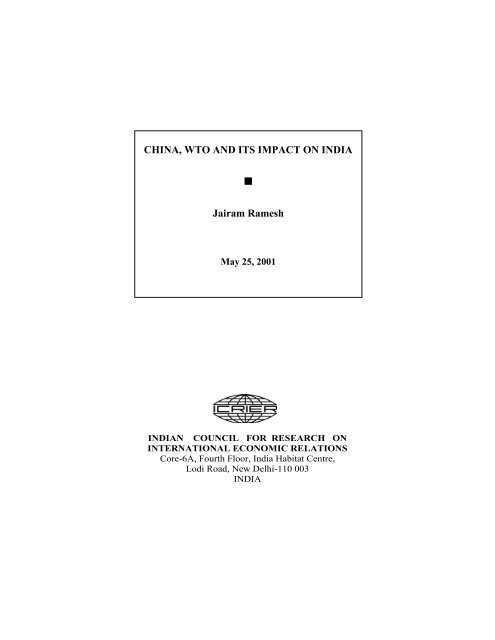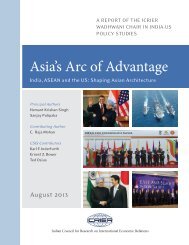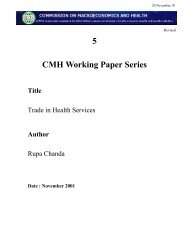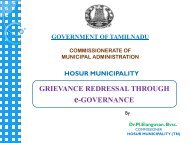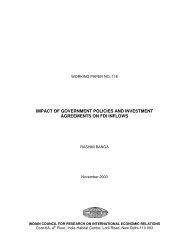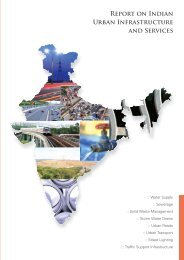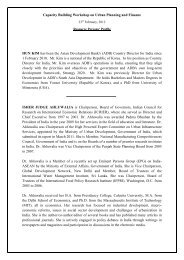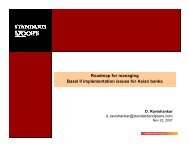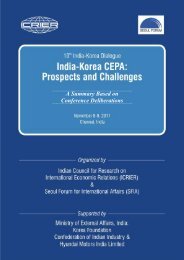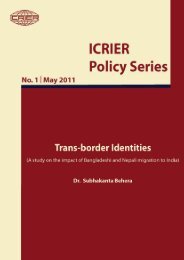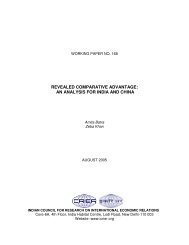china, wto and its impact on india - icrier
china, wto and its impact on india - icrier
china, wto and its impact on india - icrier
Create successful ePaper yourself
Turn your PDF publications into a flip-book with our unique Google optimized e-Paper software.
CHINA, WTO AND ITS IMPACT ON INDIA<br />
g<br />
Jairam Ramesh<br />
May 25, 2001<br />
INDIAN COUNCIL FOR RESEARCH ON<br />
INTERNATIONAL ECONOMIC RELATIONS<br />
Core-6A, Fourth Floor, India Habitat Centre,<br />
Lodi Road, New Delhi-110 003<br />
INDIA
CHINA, WTO AND ITS IMPACT ON INDIA<br />
g<br />
Jairam Ramesh<br />
May 25, 2001
Foreword<br />
In the aftermath of the phasing out of the QRs <strong>on</strong><br />
the imports into India, there has been enhanced percepti<strong>on</strong><br />
of the threat of competiti<strong>on</strong> from China. While there is a<br />
great deal of c<strong>on</strong>cern about “dumping” from China, there is<br />
also a need to comprehend the less<strong>on</strong>s of that country’s<br />
entry into the WTO for India. Mr Jairam Ramesh was<br />
invited by the Government of China to visit China <str<strong>on</strong>g>and</str<strong>on</strong>g><br />
interact with the different stakeholders in that country. In this<br />
lecture that he delivered at ICRIER, Mr. Ramesh shared his<br />
assessment of the likelihood of China’s entry into the WTO,<br />
<str<strong>on</strong>g>and</str<strong>on</strong>g> the less<strong>on</strong>s that it has for India.<br />
The perspectives provided by Mr Ramesh should<br />
help us in India to address the WTO-related issues with a<br />
degree of rati<strong>on</strong>ality <str<strong>on</strong>g>and</str<strong>on</strong>g> visi<strong>on</strong>.<br />
May, 2001<br />
Isher Judge Ahluwalia<br />
Director & Chief Executive<br />
ICRIER<br />
i
Introducti<strong>on</strong><br />
The focus of my presentati<strong>on</strong> is the current status of<br />
negotiati<strong>on</strong>s as far as China's entry into the WTO is<br />
c<strong>on</strong>cerned. I will also spell out the implicati<strong>on</strong>s of this for<br />
the internati<strong>on</strong>al trading system in relati<strong>on</strong> to China, now<br />
the tenth largest trading nati<strong>on</strong>.<br />
It is important to note that China al<strong>on</strong>g with India<br />
was am<strong>on</strong>g the founding members of GATT, but in 1950,<br />
due to Taiwan’s unilateral withdrawal, China ceased to be a<br />
member of GATT. Negotiati<strong>on</strong>s for China’s entry began in<br />
July 1986. Fifteen years is a very short period by Chinese<br />
st<str<strong>on</strong>g>and</str<strong>on</strong>g>ards. It reminds me of the story of Nix<strong>on</strong> who asked<br />
Chou en Lai in 1972 what he thought of the French<br />
revoluti<strong>on</strong>. Chou en Lai is known to have replied 'too early<br />
to say'.<br />
Negotiati<strong>on</strong>s, begun in 1986, broke off as a result of<br />
the Tiananmen Square incident in June 1989, but resumed<br />
in 1993. In 1999, negotiati<strong>on</strong>s were stalled again because of<br />
the bombing of the Chinese embassy in Belgrade, but<br />
resumed subsequently. It has been a roller-coaster ride over<br />
the past fifteen years. The expectati<strong>on</strong> now is that China<br />
will formally become a member of the WTO by November<br />
2001 when the next Ministerial meeting of the WTO takes<br />
place at Doha in Qatar. This is the expectati<strong>on</strong> of both the<br />
Chinese <str<strong>on</strong>g>and</str<strong>on</strong>g> the WTO secretariat but there are several 'ifs'<br />
<str<strong>on</strong>g>and</str<strong>on</strong>g> 'buts'.<br />
1
The Chinese Ec<strong>on</strong>omy<br />
In 2000, China’s internati<strong>on</strong>al trade was over US$<br />
470 billi<strong>on</strong>. This is roughly 38 to 40 per cent of Chinese<br />
GDP <str<strong>on</strong>g>and</str<strong>on</strong>g> about five times that of India's trade value. As<br />
Suresh Tendulkar has shown in his recent paper for<br />
ICRIER, in 1980, value of Chinese trade was twice that of<br />
India, but by 2000, this had grown to five times India’s.<br />
Tariff reducti<strong>on</strong>s in China in the last ten years have also<br />
been faster than in India. According to the latest World<br />
Development Indicators published by the World Bank, the<br />
weighted mean tariff of all products is approximately 15<br />
per cent in China whereas that in India is approximately<br />
29.5 to 30 per cent. For manufactured products the<br />
comparis<strong>on</strong> is worse. However, the reducti<strong>on</strong> in tariffs has<br />
not been accompanied by reducti<strong>on</strong> in n<strong>on</strong>-tariff barriers in<br />
China, which remains a big c<strong>on</strong>straint.<br />
As Ashok Guha <str<strong>on</strong>g>and</str<strong>on</strong>g> Amit Shovan Ray have shown in<br />
their study for ICRIER, there has been a very close link<br />
between FDI <str<strong>on</strong>g>and</str<strong>on</strong>g> exports from China in the nineties.<br />
Around 35-40 per cent of China's exports is accounted for<br />
by what the Chinese call Foreign Investment Enterprises. It<br />
is much more in Guan D<strong>on</strong>g province, where the proporti<strong>on</strong><br />
is almost 60 per cent. These foreign investments are<br />
basically by overseas Chinese- originally from H<strong>on</strong>g K<strong>on</strong>g<br />
<str<strong>on</strong>g>and</str<strong>on</strong>g> now increasingly from Taiwan- re-locating labourintensive<br />
manufacturing enterprises in China. And these<br />
foreign investments have been a very important driver of<br />
Chinese exports in recent years. This, however, is not<br />
possible in India because of the government policy of<br />
reservati<strong>on</strong> for the small-scale sector in most labourintensive<br />
manufacturing activities.<br />
2
Why does China want to join the WTO?<br />
China may be a “rogue trader” according to the US,<br />
but being the world's tenth largest trading nati<strong>on</strong> with over<br />
US$ 470 billi<strong>on</strong> of internati<strong>on</strong>al trade, why should China<br />
seek entry into the WTO at all? There are many people in<br />
our political parties too who think that by remaining<br />
outside the WTO, India can replicate the Chinese miracle in<br />
terms of internati<strong>on</strong>al trade!<br />
There are some very important political <str<strong>on</strong>g>and</str<strong>on</strong>g><br />
ec<strong>on</strong>omic reas<strong>on</strong>s behind the Chinese desire to join the<br />
WTO.<br />
1. The Chinese move for joining the WTO is an integral<br />
part of the internati<strong>on</strong>alizati<strong>on</strong> of the Chinese ec<strong>on</strong>omy<br />
first enunciated by Deng Xiaoping in 1978. China is a<br />
member of most internati<strong>on</strong>al organizati<strong>on</strong>s,<br />
particularly those in the ec<strong>on</strong>omic <str<strong>on</strong>g>and</str<strong>on</strong>g> financial<br />
spheres. WTO is the <strong>on</strong>ly excepti<strong>on</strong>. Entry into the<br />
GATT/WTO is part of their modernizati<strong>on</strong> programme<br />
which saw China become member of the World Bank<br />
<str<strong>on</strong>g>and</str<strong>on</strong>g> the IMF. Due to the protracted negotiating process<br />
in the WTO, the Chinese have not been able to become<br />
a member so far.<br />
2. The WTO card is being used very creatively by Zhu<br />
R<strong>on</strong>gji <str<strong>on</strong>g>and</str<strong>on</strong>g> his colleagues to carry out massive<br />
domestic policy reforms. The Chinese have creatively<br />
used the WTO compulsi<strong>on</strong> to carry out a lot of<br />
changes domestically, in the political sphere, in the<br />
legal sphere as well as in the ec<strong>on</strong>omic sphere,<br />
3
particularly in areas of domestic taxati<strong>on</strong> <str<strong>on</strong>g>and</str<strong>on</strong>g> value<br />
added taxati<strong>on</strong>. They have also used the WTO card<br />
for carrying out very significant domestic changes in<br />
ec<strong>on</strong>omic rules <str<strong>on</strong>g>and</str<strong>on</strong>g> regulati<strong>on</strong>s.<br />
3. China's PNTR (Permanent Normal Trading Relati<strong>on</strong>s)<br />
status hinges <strong>on</strong> annual certificati<strong>on</strong> by the US of their<br />
domestic policies. The Chinese are subjected to<br />
pressure by the U.S.A. <strong>on</strong> issues relating to pris<strong>on</strong><br />
labour <str<strong>on</strong>g>and</str<strong>on</strong>g> human rights violati<strong>on</strong>. The Chinese are<br />
keen to get away from the annual certificati<strong>on</strong> of<br />
domestic policies <str<strong>on</strong>g>and</str<strong>on</strong>g> from the c<strong>on</strong>diti<strong>on</strong>al MFN<br />
negotiati<strong>on</strong>s <str<strong>on</strong>g>and</str<strong>on</strong>g> work instead for membership of the<br />
WTO.<br />
4. The ec<strong>on</strong>omic relati<strong>on</strong>ship between Taiwan <str<strong>on</strong>g>and</str<strong>on</strong>g> China<br />
is growing. Taiwan today accounts for approximately<br />
15 per cent of world's semi c<strong>on</strong>ductor producti<strong>on</strong>. The<br />
Chinese see Taiwan as a very important element of<br />
their efforts toward global dominati<strong>on</strong> in the<br />
knowledge based IT industry. Taiwan's hardware<br />
capability together with the Chinese software<br />
capabilities could be exploited for global preeminence<br />
in the field where India certainly has an edge.<br />
Immediately following the Chinese entry into the<br />
WTO, Taiwan too is likely to become a member of the<br />
WTO. The Chinese are hoping that by joining the<br />
WTO, the Taiwanese reluctance for closer ec<strong>on</strong>omic<br />
interacti<strong>on</strong>s with China <strong>on</strong> a very overt basis will be<br />
overcome <str<strong>on</strong>g>and</str<strong>on</strong>g> there would be formal linkages between<br />
China <str<strong>on</strong>g>and</str<strong>on</strong>g> Taiwan. The Chinese are laying out the red<br />
carpet for Taiwanese investors <str<strong>on</strong>g>and</str<strong>on</strong>g> are desperately<br />
wooing investment from Taiwan. Almost 20 per cent<br />
4
of the investment in China in the last five years has<br />
come from Taiwan. Most of the Chinese overseas<br />
investment in Chinese hi-tech industries in Fujiang<br />
province particularly is coming from Taiwan.<br />
Current Status of Negotiati<strong>on</strong>s<br />
Accessi<strong>on</strong> to the WTO is a two-track process. The<br />
bilateral agreements have to be c<strong>on</strong>cluded <str<strong>on</strong>g>and</str<strong>on</strong>g> deposited<br />
with the WTO secretariat as a first step. These then need to<br />
be accepted by all WTO members, <str<strong>on</strong>g>and</str<strong>on</strong>g> up<strong>on</strong> acceptance,<br />
automatically get multilateralized. Simultaneously, the<br />
sec<strong>on</strong>d track of multilateral agreement also has to be<br />
negotiated to the satisfacti<strong>on</strong> of all member countries. Only<br />
after that, the accessi<strong>on</strong> by c<strong>on</strong>sensus takes place. If any<br />
member country raises an objecti<strong>on</strong> at any stage of<br />
negotiati<strong>on</strong>, the membership cannot be granted.<br />
As regards the current status of negotiati<strong>on</strong>s for<br />
China, a total of 45 bilateral agreements are to be<br />
c<strong>on</strong>cluded before China gets an entry into the WTO. Out of<br />
these, 36 have been signed, chiefly triggered by the<br />
November 1999 agreement between the U.S.A. <str<strong>on</strong>g>and</str<strong>on</strong>g> China.<br />
Out of the remaining nine, the three most important <strong>on</strong>es<br />
that have not been signed are with New Zeal<str<strong>on</strong>g>and</str<strong>on</strong>g> (dispute<br />
over kiwis, oranges <str<strong>on</strong>g>and</str<strong>on</strong>g> fru<str<strong>on</strong>g>its</str<strong>on</strong>g>), Israel <str<strong>on</strong>g>and</str<strong>on</strong>g> Mexico. The<br />
Chinese believe that the Mexicans have been put up by the<br />
Americans to make life difficult for them. The issue at<br />
stake between China <str<strong>on</strong>g>and</str<strong>on</strong>g> Mexico is the gr<str<strong>on</strong>g>and</str<strong>on</strong>g>father clause<br />
<strong>on</strong> anti-dumping duties. According to this clause, all the<br />
anti-dumping duties imposed by Mexico would be<br />
withdrawn <strong>on</strong>ce the bilateral agreement is c<strong>on</strong>cluded. The<br />
Mexicans however, want the duties to be retained.<br />
5
It is worth nothing that at present there are 29<br />
countries waiting in the wing to join the WTO. The most<br />
recent entrant was Moldova <str<strong>on</strong>g>and</str<strong>on</strong>g> that was d<strong>on</strong>e fairly<br />
recently. Russia is an important n<strong>on</strong>-member <str<strong>on</strong>g>and</str<strong>on</strong>g> the<br />
Russian entry into WTO is seen at least 10 to 12 years<br />
ahead. Iran wants to join the WTO but again serious<br />
negotiati<strong>on</strong>s have not taken place with Iran. However,<br />
Chinese entry into the WTO would be a critical test not just<br />
for Chinese ability <str<strong>on</strong>g>and</str<strong>on</strong>g> willingness to become a member of<br />
the WTO, but also of how robust the WTO accessi<strong>on</strong><br />
process is.<br />
China <str<strong>on</strong>g>and</str<strong>on</strong>g> the WTO- Five Points of Disagreement<br />
There are certain fundamental issues that still divide<br />
China <str<strong>on</strong>g>and</str<strong>on</strong>g> the WTO working party in the c<strong>on</strong>text of<br />
multilateral negotiati<strong>on</strong>s.<br />
A major issue relates to China's st<str<strong>on</strong>g>and</str<strong>on</strong>g> that it should<br />
be treated as a developing country, since their per capita<br />
income at $790 is below the threshold. On the WTO<br />
Agreement <strong>on</strong> Agriculture, this has bearing <strong>on</strong> how the<br />
AMS (aggregate measure of support) is determined. The<br />
AMS calculati<strong>on</strong>s for China, however, reveal that in 2000<br />
the AMS was about 2 per cent of the value of producti<strong>on</strong>.<br />
This is within the de minimus level irrespective of whether<br />
China is treated as a developing or developed country.<br />
Since the flexibility that the Subsidy <str<strong>on</strong>g>and</str<strong>on</strong>g> Countervailing<br />
Measures Agreement (in WTO) gives to developing<br />
countries is much more than for developed countries, this is<br />
another reas<strong>on</strong> the Chinese want to be treated as a<br />
developing country. The Europeans, Americans <str<strong>on</strong>g>and</str<strong>on</strong>g> the<br />
6
Japanese, however, are worried about dumping from China.<br />
Hence they do not want China to be accorded the status of a<br />
developing country.<br />
Another important difference relates to technical<br />
agreements with respect to the use of safety, assessment,<br />
<str<strong>on</strong>g>and</str<strong>on</strong>g> certificati<strong>on</strong> processes. Chinese regulati<strong>on</strong>s exist <strong>on</strong>ly<br />
<strong>on</strong> paper <str<strong>on</strong>g>and</str<strong>on</strong>g> are pretty n<strong>on</strong>-transparent. According to<br />
article X of the erstwhile GATT, transparency is a very<br />
essential element of the accessi<strong>on</strong> process. This is the<br />
Achilles heel of the Chinese entry into the WTO since there<br />
is virtually no transparency. This is particularly true for<br />
technical barriers to trade.<br />
Trading rights are not available to foreign firms in<br />
China. A Chinese firm can import for local distributi<strong>on</strong>, but<br />
foreign firms cannot. The Chinese law distinguishes<br />
between Chinese firms, Chinese firms with foreign equity<br />
<str<strong>on</strong>g>and</str<strong>on</strong>g> wholly owned foreign firms. Only wholly-owned<br />
Chinese firms can import for trading, i.e., for local<br />
distributi<strong>on</strong>. Other two categories also are allowed to<br />
import, but <strong>on</strong>ly for use in their own manufacturing<br />
process. The Europeans, the Americans <str<strong>on</strong>g>and</str<strong>on</strong>g> the Japanese<br />
are insisting <strong>on</strong> market access for trading firms in n<strong>on</strong>wholly<br />
owned enterprises, whereas the Chinese are<br />
reluctant to grant trading rights to foreign firms.<br />
A related issue is that there is no nati<strong>on</strong>al law in<br />
relati<strong>on</strong> to trading rights of foreign firms in China.<br />
Shanghai may have <str<strong>on</strong>g>its</str<strong>on</strong>g> own regulati<strong>on</strong>s, which might be<br />
different from that of Beijing which is an independent<br />
municipality. Since the WTO accessi<strong>on</strong> requires a single<br />
7
point access to all these regulati<strong>on</strong>s in a transparent<br />
manner, nati<strong>on</strong>al regulati<strong>on</strong> is important.<br />
Finally, there are some technical issues relating to<br />
services sector offer, particularly in relati<strong>on</strong> to insurance<br />
<str<strong>on</strong>g>and</str<strong>on</strong>g> financial services, where the Americans are not happy<br />
with the nati<strong>on</strong>al treatment provisi<strong>on</strong>s that the Chinese have<br />
put in. Incidentally, the Chinese offer <strong>on</strong> services is far<br />
more liberal than that of India. In telecommunicati<strong>on</strong>s<br />
India has still not offered 50 per cent foreign equity directly<br />
in basic telecommunicati<strong>on</strong> services, whereas the Chinese<br />
have d<strong>on</strong>e so. In Insurance, by law, we do not permit more<br />
than 26 per cent, whereas China is much more liberal.<br />
They are much more liberal in banking as well as in most<br />
other services like accountancy <str<strong>on</strong>g>and</str<strong>on</strong>g> legal professi<strong>on</strong>s. This<br />
may well be because they do not have a large enough base<br />
of domestic accountancy firms <str<strong>on</strong>g>and</str<strong>on</strong>g> domestic law firms. The<br />
Americans <str<strong>on</strong>g>and</str<strong>on</strong>g> the Europeans, however, feel that the<br />
Chinese offer does not go far enough, particularly so far as<br />
nati<strong>on</strong>al treatment is c<strong>on</strong>cerned.<br />
Is Chinese membership of the WTO likely by November<br />
2001?<br />
With most of bilateral agreements in place <str<strong>on</strong>g>and</str<strong>on</strong>g> with<br />
the multilateral agreement now in <str<strong>on</strong>g>its</str<strong>on</strong>g> c<strong>on</strong>cluding stages of<br />
negotiati<strong>on</strong>, the expectati<strong>on</strong> is that China would join the<br />
WTO by the time the next Ministerial meeting takes place<br />
at Qatar in the first week of November. There are<br />
impediments, however.<br />
There is a general weakening in the US-Chinese<br />
relati<strong>on</strong>s. China has shifted from being a strategic partner<br />
8
of the US to <str<strong>on</strong>g>its</str<strong>on</strong>g> strategic competitor. Besides, China does<br />
not figure at all in President Bush's legislative agenda for<br />
2001 which includes a global round of negotiati<strong>on</strong>s, a<br />
regi<strong>on</strong>al round of negotiati<strong>on</strong>s for the free trade agreement<br />
for the Americas by January 2005 <str<strong>on</strong>g>and</str<strong>on</strong>g> a bilateral route for<br />
negotiati<strong>on</strong>s. In the bilateral route, three countries- Jordan,<br />
Singapore <str<strong>on</strong>g>and</str<strong>on</strong>g> Chile -have been identified for further<br />
bilateral negotiati<strong>on</strong>s towards a free trade agreement in<br />
additi<strong>on</strong> to a bilateral preferential trade agreement with<br />
Vietnam <str<strong>on</strong>g>and</str<strong>on</strong>g> Laos. This is unlike during the Clint<strong>on</strong><br />
administrati<strong>on</strong> when China's entry into the WTO was seen<br />
to be a major achievement for the US.<br />
There is also a technical problem. The US C<strong>on</strong>gress<br />
extended PNTR to China in 1999 <str<strong>on</strong>g>and</str<strong>on</strong>g> then subsequently in<br />
May 2000 <strong>on</strong> the c<strong>on</strong>diti<strong>on</strong> that the US President would<br />
certify to the C<strong>on</strong>gress that the WTO multilateral<br />
agreement is as beneficial to the Americans as the bilateral<br />
agreement that China <str<strong>on</strong>g>and</str<strong>on</strong>g> America had signed in 1999. The<br />
last date for fulfilling this c<strong>on</strong>diti<strong>on</strong> is June 3, 2001 1 . The<br />
multilateral agreement however, has not been c<strong>on</strong>cluded<br />
yet. If this certificati<strong>on</strong> does not take place by June 3,<br />
1<br />
There was a provisi<strong>on</strong> in last year’s (2000) legislati<strong>on</strong> approving<br />
PNTR that China join the World Trade Organizati<strong>on</strong> by June 2001.<br />
Because China failed to meet that deadline, US lawmakers had been<br />
preparing for another PNTR vote. But <strong>on</strong> June 11, 2001, US <str<strong>on</strong>g>and</str<strong>on</strong>g><br />
Chinese trade negotiators reached an agreement <strong>on</strong> key outst<str<strong>on</strong>g>and</str<strong>on</strong>g>ing<br />
bilateral issues. “It now appears that C<strong>on</strong>gress need <strong>on</strong>ly <strong>on</strong>e last<br />
time - for the span of just a few m<strong>on</strong>ths – before China becomes a<br />
full member of the WTO.” China has now completed all of <str<strong>on</strong>g>its</str<strong>on</strong>g><br />
bilateral talks <strong>on</strong> WTO entry except for Mexico <str<strong>on</strong>g>and</str<strong>on</strong>g> Central<br />
America.<br />
Source: Asia Times Online, 12 July, 2001 in WTO Press review<br />
dated 12 July 2001.<br />
9
China loses <str<strong>on</strong>g>its</str<strong>on</strong>g> PNTR status with the US. It reverts to a<br />
c<strong>on</strong>diti<strong>on</strong>al MFN regime which then means Dalai Lama,<br />
pris<strong>on</strong> labour, 'three gorges project' etc. All the n<strong>on</strong>-trade<br />
issues come into the fore during negotiati<strong>on</strong>s for the MFN<br />
renewal. As of now it appears that the June 3 deadline is<br />
unlikely to be met which means that the negotiati<strong>on</strong>s <strong>on</strong> the<br />
multilateral agreement would slip. In that event, China's<br />
entry into the WTO will certainly not take place in<br />
November 2001. It would slip, if not till the next<br />
Ministerial in 2003, then certainly until sometime towards<br />
the latter part of next year. As of now it does look that<br />
Chinese entry into the WTO is not <strong>on</strong> the cards in<br />
November 2001.<br />
Oppositi<strong>on</strong> to WTO in China<br />
I went to China at the invitati<strong>on</strong> of the Nati<strong>on</strong>al<br />
People's C<strong>on</strong>gress which is their equivalent of the Indian<br />
Lok Sabha. My interlocutors were Members of provincial<br />
C<strong>on</strong>gresses <str<strong>on</strong>g>and</str<strong>on</strong>g> the Nati<strong>on</strong>al People's C<strong>on</strong>gress. I saw that<br />
there is oppositi<strong>on</strong> to the WTO membership in China as<br />
well. Zhu R<strong>on</strong>gji is a great moderniser. He is the man<br />
spearheading Chinese membership of the WTO. He gives<br />
up his office of Premier in May 2002. He wants to go down<br />
in history as the man who got China into the mainstream of<br />
internati<strong>on</strong>al trade <str<strong>on</strong>g>and</str<strong>on</strong>g> internati<strong>on</strong>al ec<strong>on</strong>omics,<br />
exemplified by the WTO. Jiang Zemin, unlike Zhu R<strong>on</strong>gji,<br />
is much more lukewarm. He has never come out openly in<br />
favour of China joining the WTO. Li Peng is a hardliner.<br />
He is the third most important man in the Chinese<br />
hierarchy. He is the Chinese counterpart of the Lok Sabha<br />
Speaker. He was the prime mover in the Tiananmen Square<br />
incident.<br />
10
The Nati<strong>on</strong>al People's C<strong>on</strong>gress would not be<br />
unhappy to see the delay in China's entry into the WTO.<br />
They are aware of the fact that China has become the<br />
world's tenth largest trading nati<strong>on</strong>, with internati<strong>on</strong>al trade<br />
at US$ 470 billi<strong>on</strong> c<strong>on</strong>stituting 40% of GDP. China has<br />
also cornered the world market for garments, for plastics,<br />
for toys <str<strong>on</strong>g>and</str<strong>on</strong>g> for semi-c<strong>on</strong>ductors. And all this was achieved<br />
while remaining outside the WTO. Then, why enter the<br />
WTO <str<strong>on</strong>g>and</str<strong>on</strong>g> be subject to Anglo-Sax<strong>on</strong> nuisances like<br />
transparency laws? There is a very str<strong>on</strong>g lobby in China<br />
which would not be unhappy – although they are not<br />
actively opposing the WTO - if there is a delay in the WTO<br />
entry process. But Zhu R<strong>on</strong>gji <str<strong>on</strong>g>and</str<strong>on</strong>g> the Ministry of Foreign<br />
Trade <str<strong>on</strong>g>and</str<strong>on</strong>g> Ec<strong>on</strong>omic Cooperati<strong>on</strong> (MOFTEC) have made<br />
China's entry into the WTO almost a prestige issue.<br />
It is remarkable how proactively the Chinese political<br />
leadership is talking about the benef<str<strong>on</strong>g>its</str<strong>on</strong>g> of China's entry into<br />
the WTO <str<strong>on</strong>g>and</str<strong>on</strong>g> what it means for China. The day I l<str<strong>on</strong>g>and</str<strong>on</strong>g>ed in<br />
China there was a big trade war between Japan <str<strong>on</strong>g>and</str<strong>on</strong>g> China.<br />
Japan imposed 300 per cent duty <strong>on</strong> the import of Chinese<br />
spring-<strong>on</strong>i<strong>on</strong>s which the Japanese felt was flooding their<br />
market. Chinese political leadership seized this opportunity<br />
to publicly talk about the benef<str<strong>on</strong>g>its</str<strong>on</strong>g> of WTO membership. On<br />
State-owned televisi<strong>on</strong>, Zhu R<strong>on</strong>gji's people were seen<br />
talking that such unilateralism by the Japanese would not<br />
have been possible if China was a member of the WTO! It<br />
was a remarkable expressi<strong>on</strong> of aggressive intent <strong>on</strong> the<br />
part of the political leadership to come out <str<strong>on</strong>g>and</str<strong>on</strong>g> say that<br />
there are benef<str<strong>on</strong>g>its</str<strong>on</strong>g> of WTO membership. The government is<br />
c<strong>on</strong>tinuously reinforcing this message through print media<br />
that to sustain China's 8 per cent plus ec<strong>on</strong>omic growth<br />
11
performance, <str<strong>on</strong>g>its</str<strong>on</strong>g> extraordinary export performance <str<strong>on</strong>g>and</str<strong>on</strong>g> <str<strong>on</strong>g>its</str<strong>on</strong>g><br />
FDI drive, WTO membership is a sine qua n<strong>on</strong>.<br />
Interestingly, India views the WTO largely in the<br />
c<strong>on</strong>text of internati<strong>on</strong>al trade but Chinese view it<br />
complementarily with investment because of the intimate<br />
nexus between Chinese trade <str<strong>on</strong>g>and</str<strong>on</strong>g> foreign investment.<br />
When they talk about WTO they talk about not just<br />
internati<strong>on</strong>al trade but also about creating a hospitable<br />
envir<strong>on</strong>ment for foreign investment. Here is a country that<br />
is getting US$ 40 billi<strong>on</strong> plus of foreign investment every<br />
year <str<strong>on</strong>g>and</str<strong>on</strong>g> is talking about creating a hospitable envir<strong>on</strong>ment<br />
for foreign investment. They realize that getting US$ 40<br />
billi<strong>on</strong> is not enough <str<strong>on</strong>g>and</str<strong>on</strong>g> they need much more. My<br />
interlocutors at China were from provinces <str<strong>on</strong>g>and</str<strong>on</strong>g> they<br />
advanced arguments which are similar to those advanced in<br />
India. These provinces were as opposed to the WTO as my<br />
colleagues in the C<strong>on</strong>gress party or many colleagues in the<br />
BJP <str<strong>on</strong>g>and</str<strong>on</strong>g> CPM.<br />
The federal map of China is being re-drawn. China is<br />
moving from being a decentralized dictatorship to a<br />
centralized democracy. This is <strong>on</strong>e of the great paradoxes<br />
of political ec<strong>on</strong>omy. We tend to think that democratic<br />
India is more decentralized than dictatorial China. All<br />
fiscal indicators in China indicate that China is much more<br />
decentralized. For instance, the Centre's share of revenue<br />
collecti<strong>on</strong> is about 62.5 per cent in India, whereas in China<br />
the Centre's share of revenue collecti<strong>on</strong> is 40 per cent.<br />
India has been more of a centralized democracy <str<strong>on</strong>g>and</str<strong>on</strong>g> China<br />
has been more of decentralized dictatorship. But in the last<br />
five years the WTO has been used creatively by Zhu R<strong>on</strong>gji<br />
<str<strong>on</strong>g>and</str<strong>on</strong>g> others to take power away from the provinces <str<strong>on</strong>g>and</str<strong>on</strong>g> the<br />
12
municipalities <str<strong>on</strong>g>and</str<strong>on</strong>g> vest it with the federal government.<br />
China, for instance, has <strong>on</strong>ly <strong>on</strong>e rate for value added tax<br />
(VAT). Even though this was opposed by the provinces as<br />
well as by people in the Nati<strong>on</strong>al People's C<strong>on</strong>gress. The<br />
unstated principle in the discussi<strong>on</strong> was that the Chinese<br />
would like to see an increasing share of revenue being<br />
collected not by the provinces but by the Central<br />
government. It is interesting that India is c<strong>on</strong>sciously<br />
moving in the opposite directi<strong>on</strong>.<br />
One of the requirements of article X of GATT is<br />
transparency. China does not have <strong>on</strong>e law. There are<br />
provincial laws <str<strong>on</strong>g>and</str<strong>on</strong>g> municipal laws. The Mayor of<br />
Shanghai is more powerful than perhaps even the Prime<br />
Minister of India. With the WTO membership the<br />
provincial powers would be curtailed. They would be<br />
subjected to some centralized bureaucracy. This is a big<br />
fear in the provincial C<strong>on</strong>gresses, although they are all part<br />
of the Communist party.<br />
It is also worth noting that although it is a <strong>on</strong>e party<br />
system in China, the Chinese Communist Party is more<br />
democratic than the C<strong>on</strong>gress Party <str<strong>on</strong>g>and</str<strong>on</strong>g> the BJP put<br />
together. Neither the C<strong>on</strong>gress nor the BJP would ever have<br />
the courage to pass a resoluti<strong>on</strong> <str<strong>on</strong>g>and</str<strong>on</strong>g> say Jawaharlal Nehru<br />
or Deen Dayal Upadhyaya were 60 per cent right <str<strong>on</strong>g>and</str<strong>on</strong>g> 40<br />
per cent wr<strong>on</strong>g! This is precisely what the Chinese<br />
communist party did in 1982. They passed a resoluti<strong>on</strong><br />
saying that Mao was 70 per cent right <str<strong>on</strong>g>and</str<strong>on</strong>g> 30 per cent<br />
wr<strong>on</strong>g. It is called the 70-30 rule. In China, despite a <strong>on</strong>e<br />
party system, the level of discussi<strong>on</strong> <str<strong>on</strong>g>and</str<strong>on</strong>g> debate that takes<br />
place is of a very high order. It is a plurilateral system of<br />
13
discussi<strong>on</strong>. Once the discussi<strong>on</strong> is over <str<strong>on</strong>g>and</str<strong>on</strong>g> a decisi<strong>on</strong> is<br />
taken, the implementati<strong>on</strong> <str<strong>on</strong>g>and</str<strong>on</strong>g> enforcement is easier.<br />
One important feature of China which cannot be<br />
ignored is that the politics of China is changing. China is<br />
growing from being a fiscally decentralized c<strong>on</strong>glomerate<br />
to a fiscally more centralized system of political<br />
management, <str<strong>on</strong>g>and</str<strong>on</strong>g> what this does to province-centre<br />
relati<strong>on</strong>s time al<strong>on</strong>e will tell. But it is certain now that the<br />
dice is heavily loaded in favour of the federal government.<br />
The provinces which have enjoyed great fiscal aut<strong>on</strong>omy<br />
are now beginning to react negatively, <str<strong>on</strong>g>and</str<strong>on</strong>g> they are now<br />
forming a phalanx of oppositi<strong>on</strong> to the WTO.<br />
The WTO <str<strong>on</strong>g>and</str<strong>on</strong>g> Law<br />
In India, there are many trade experts, <str<strong>on</strong>g>and</str<strong>on</strong>g> <strong>on</strong>ly a few<br />
lawyers, dealing with the WTO issues. The Chinese have<br />
realized that the WTO is increasingly about law, <str<strong>on</strong>g>and</str<strong>on</strong>g> have<br />
sought German assistance in building up their legal system.<br />
The Chinese feel more comfortable with the Germans, <str<strong>on</strong>g>and</str<strong>on</strong>g><br />
are not too happy with the Americans. 2<br />
Perhaps because Germany is seen to be <strong>on</strong>e of the<br />
very few countries that did not impose their will in pre-<br />
Communist China. The Japanese occupied China, the<br />
British put the treaty of Nanking <str<strong>on</strong>g>and</str<strong>on</strong>g> the opium trade <str<strong>on</strong>g>and</str<strong>on</strong>g><br />
the Americans had their own protestant missi<strong>on</strong>aries.<br />
2 Sixty per cent of all cars sold in China are volkswag<strong>on</strong> cars. So<br />
there is a special relati<strong>on</strong>ship. Germany gets treated differently in<br />
China <str<strong>on</strong>g>and</str<strong>on</strong>g> there is a great respect for Germany.<br />
14
Germany is seen to be much more friendly. The Germans<br />
have a big project with China for redrawing their entire<br />
legal apparatus.<br />
There are three pillars of law, viz., the law <str<strong>on</strong>g>its</str<strong>on</strong>g>elf, the<br />
enforcement of the law <str<strong>on</strong>g>and</str<strong>on</strong>g> the c<strong>on</strong>flict resoluti<strong>on</strong><br />
mechanism available in the law. The Chinese have laws<br />
covering everything. The enforcement of the law <str<strong>on</strong>g>and</str<strong>on</strong>g> the<br />
c<strong>on</strong>flict resoluti<strong>on</strong> are big questi<strong>on</strong> marks. For example,<br />
they have intellectual property rights protecti<strong>on</strong>; they have<br />
trade mark laws; they have patent laws. But it is comm<strong>on</strong><br />
knowledge that they are the largest software piracy market<br />
in the world. In fact, the story in the IT industry is that<br />
copyright means right to copy! And the Chinese have<br />
mastered that.<br />
In China, the distincti<strong>on</strong> between administrative<br />
regulati<strong>on</strong>, internal directive <str<strong>on</strong>g>and</str<strong>on</strong>g> law is very thin. A<br />
transparent set of regulati<strong>on</strong>s which are enforceable <str<strong>on</strong>g>and</str<strong>on</strong>g><br />
which are c<strong>on</strong>testable judicially are steps in the legal<br />
process that the Chinese have yet to take. And this is<br />
actually becoming a big c<strong>on</strong>straint to them in their WTO<br />
accessi<strong>on</strong>. It would remain a c<strong>on</strong>straint even after they have<br />
entered the WTO. Chinese would absorb a large share of<br />
WTO’s dispute settlement time.<br />
India too cannot boast of <str<strong>on</strong>g>its</str<strong>on</strong>g> legal system. India has<br />
laws, but the enforcement remains weak. And the c<strong>on</strong>flict<br />
resoluti<strong>on</strong> in terms of WTO laws remains to be tested. India<br />
certainly has more lawyers than China has. But it is<br />
c<strong>on</strong>testable if India has far greater body of trade law than<br />
China. However, India does score over China in terms of<br />
15
having greater experience in the enforcement machinery<br />
through the court system.<br />
Less<strong>on</strong>s from China<br />
1. The most important less<strong>on</strong> to be learnt from the<br />
Chinese experience is their thrust at public educati<strong>on</strong> <strong>on</strong><br />
benef<str<strong>on</strong>g>its</str<strong>on</strong>g> from WTO membership. Occasi<strong>on</strong>ally, Mr.<br />
Vajpai does show signs of taking the bull by the horns<br />
<str<strong>on</strong>g>and</str<strong>on</strong>g> assert that reforms have worked in India, poverty<br />
has come down <str<strong>on</strong>g>and</str<strong>on</strong>g> that labour must adjust. The<br />
Chinese political leadership, <strong>on</strong> the other h<str<strong>on</strong>g>and</str<strong>on</strong>g>, is proactively<br />
pushing WTO's entry as not just an ec<strong>on</strong>omic<br />
signal but also a political signal. It is not entry by<br />
stealth. It is entry fr<strong>on</strong>tally, taking <strong>on</strong> the issues <str<strong>on</strong>g>and</str<strong>on</strong>g><br />
acknowledging the likely pains of transiti<strong>on</strong>. I was<br />
invited to China to share with the legislators how India<br />
has managed to overcome (they are entitled to have<br />
their own illusi<strong>on</strong>s!) oppositi<strong>on</strong> to agreements <strong>on</strong><br />
agriculture <str<strong>on</strong>g>and</str<strong>on</strong>g> intellectual property rights. Specifically,<br />
to share with the Chinese how India has built this great<br />
domestic c<strong>on</strong>sensus <strong>on</strong> intellectual property <str<strong>on</strong>g>and</str<strong>on</strong>g> <strong>on</strong><br />
agriculture.<br />
2. The str<strong>on</strong>g pro-WTO statements emanating from the<br />
political leadership have sent a very clear signal that<br />
China wants to enter the WTO. There have been very<br />
str<strong>on</strong>g political statements in favour of WTO from the<br />
Premier as well as MOFTEC. In India, this is missing<br />
even though we are a Member of the WTO.<br />
3. There is a great emphasis <strong>on</strong> legal infrastructure in<br />
China. Most WTO related meetings in India are<br />
16
attended <strong>on</strong>ly by retired civil servants, retired<br />
ambassadors to GATT <str<strong>on</strong>g>and</str<strong>on</strong>g> ec<strong>on</strong>omists talking about<br />
trade. Lawyers- let al<strong>on</strong>e trade lawyers- are completely<br />
absent. The Chinese, <strong>on</strong> the other h<str<strong>on</strong>g>and</str<strong>on</strong>g>, have<br />
recognized that the expertise in trade law is critical to<br />
get benef<str<strong>on</strong>g>its</str<strong>on</strong>g> of the WTO membership.<br />
Patent administrati<strong>on</strong> is <strong>on</strong>e example. In India, we have<br />
looked at Patents, the whole area of intellectual<br />
property rights, have passed laws <str<strong>on</strong>g>and</str<strong>on</strong>g> have had a big<br />
debate for last ten years <strong>on</strong> product patent, process<br />
patent, compulsory licensing <str<strong>on</strong>g>and</str<strong>on</strong>g> nati<strong>on</strong>al interest. One<br />
visit to Karol Bagh Patent office would shatter all<br />
dreams of Indian leadership in patents. Is this tottering<br />
<str<strong>on</strong>g>and</str<strong>on</strong>g> shabby Patents office going to spearhead India's<br />
entry into the knowledge-based ec<strong>on</strong>omy in which we<br />
have a competitive advantage?<br />
The ten-storey patent administrati<strong>on</strong> office in China<br />
built with German assistance is just mind boggling. The<br />
Chinese have recognized that administrati<strong>on</strong> is as<br />
important as the ec<strong>on</strong>omics of law. The Chinese may<br />
curse the world but they have g<strong>on</strong>e out to get<br />
assistance. Besides assisting China in building this<br />
modern Patent Office, the Germans are also involved in<br />
several other projects. The European Uni<strong>on</strong> too is<br />
involved in a large number of projects. The whole drive<br />
is towards creating a major legal expertise so that the<br />
legal foundati<strong>on</strong>s of China's WTO entry are str<strong>on</strong>g. Of<br />
course, it could be argued that the Chinese have<br />
mastered rule through law, <str<strong>on</strong>g>and</str<strong>on</strong>g> still they do not know<br />
rule by law. It is legal formalism, they want laws, laws<br />
<str<strong>on</strong>g>and</str<strong>on</strong>g> more laws, they want lawyers, lawyers <str<strong>on</strong>g>and</str<strong>on</strong>g> more<br />
17
lawyers. But are they prepared for rule by law? Be that<br />
as it may, there is little doubt that the Chinese have<br />
taken the first step by building the legal expertise.<br />
C<strong>on</strong>clusi<strong>on</strong><br />
Two greatest fears the Chinese have are in respect of<br />
agriculture <str<strong>on</strong>g>and</str<strong>on</strong>g> TRIPS. What would the WTO agreement<br />
do to agriculture? This is much the same fear that has been<br />
expressed even in India. What would TRIPS do to Chinese<br />
expertise in this area?<br />
The day I l<str<strong>on</strong>g>and</str<strong>on</strong>g>ed in China the pharmaceutical<br />
companies, who had taken the South African government<br />
to court over what they felt was patent infringement by the<br />
South African government <strong>on</strong> AIDS drugs, actually<br />
withdrew their petiti<strong>on</strong>. This is a major victory for those<br />
who believe that there is a balance between the interest of<br />
the c<strong>on</strong>sumers <str<strong>on</strong>g>and</str<strong>on</strong>g> the producers of knowledge. Just four<br />
days ago, Robert Zoellick, the US trade negotiator, has<br />
given a speech where, for the first time in fifteen years, an<br />
American trade negotiator has said that there is a public<br />
interest angle in intellectual property. When it comes to<br />
public health emergencies like AIDS, intellectual property<br />
must give way to c<strong>on</strong>sumer interest. The noti<strong>on</strong> that there<br />
is balance between the c<strong>on</strong>sumer interest <str<strong>on</strong>g>and</str<strong>on</strong>g> the producer<br />
interest is now sinking in. This is <strong>on</strong>e of the reas<strong>on</strong>s why<br />
the Americans did not take part in dispute settlement over<br />
TRIPS <str<strong>on</strong>g>and</str<strong>on</strong>g> the Americans are foot-dragging over taking<br />
Argentina into dispute settlement over their patent laws.<br />
The Argentinians <str<strong>on</strong>g>and</str<strong>on</strong>g> the Brazilians have g<strong>on</strong>e very far in<br />
introducing public interest provisi<strong>on</strong>s in their patent<br />
legislati<strong>on</strong>. This is of great interest to China.<br />
18
The Chinese are also of course very c<strong>on</strong>cerned with<br />
the great Indian leadership in IT. Their c<strong>on</strong>cern is not<br />
border dispute or Aksai Chin or NEFA, it is the Indian<br />
leadership in IT. In the calendar year 2000, India's software<br />
exports of IT were $6.2 billi<strong>on</strong>, China's exports were $600<br />
milli<strong>on</strong>. The Chinese now realize that the reas<strong>on</strong> for Indian<br />
leadership in IT is India’s investment in technology <str<strong>on</strong>g>and</str<strong>on</strong>g><br />
higher educati<strong>on</strong>. They are now planning to build 100 IITs<br />
in the next 5 to 10 years. One of the c<strong>on</strong>sultants for them is<br />
McKinsey, <str<strong>on</strong>g>and</str<strong>on</strong>g> the c<strong>on</strong>sultants from McKinsey are Indian<br />
IIT alumni! There is an interesting ir<strong>on</strong>y here also. The<br />
people who could not get time to see the Planning<br />
Commissi<strong>on</strong> <str<strong>on</strong>g>and</str<strong>on</strong>g> the Prime Minister in India, are now<br />
going to China to advise the Chinese as to how to replicate<br />
the Indian success in the IT field!<br />
The Chinese are worried about the Indian edge in IT.<br />
This too explains their great desire for closer ec<strong>on</strong>omic <str<strong>on</strong>g>and</str<strong>on</strong>g><br />
technological integrati<strong>on</strong> with Taiwan. They believe that<br />
combining Taiwan's expertise in hardware manufacturing<br />
<str<strong>on</strong>g>and</str<strong>on</strong>g> Chinese expertise in low-cost, internati<strong>on</strong>ally<br />
competitive labor would give them a tremendous edge over<br />
India. Unlike India, China realizes that IT success has to be<br />
both in software <str<strong>on</strong>g>and</str<strong>on</strong>g> hardware. They are laying as much<br />
stress <strong>on</strong> hardware as <strong>on</strong> software.<br />
19
Summary of Discussi<strong>on</strong><br />
The presentati<strong>on</strong> by Mr. Jairam Ramesh was<br />
followed by a lively discussi<strong>on</strong>, which encompassed a wide<br />
variety of subjects related to China <str<strong>on</strong>g>and</str<strong>on</strong>g> the WTO.<br />
On the issue of Chinese accessi<strong>on</strong> to the WTO, some<br />
participants menti<strong>on</strong>ed that, due to the predominantly<br />
n<strong>on</strong>transparent structure of the Chinese ec<strong>on</strong>omy, China’s<br />
entry into the WTO would result in a significant increase in<br />
disputes between WTO members <strong>on</strong> the <strong>on</strong>e h<str<strong>on</strong>g>and</str<strong>on</strong>g> <str<strong>on</strong>g>and</str<strong>on</strong>g><br />
China <strong>on</strong> the other. This would c<strong>on</strong>siderably increase the<br />
burden <strong>on</strong> the WTO’s dispute settlement body. It was<br />
widely felt that China would take a l<strong>on</strong>g time to comply<br />
with the transparency requirements of Article X of the<br />
WTO. It was also pointed out that China has to undertake<br />
what are called WTO Plus commitments i.e., commitments<br />
in additi<strong>on</strong> to those undertaken by other WTO members.<br />
Moreover, China has not been accorded the benef<str<strong>on</strong>g>its</str<strong>on</strong>g> that<br />
are due to developing country members under the Subsidy<br />
<str<strong>on</strong>g>and</str<strong>on</strong>g> Countervailing Measures Agreements <str<strong>on</strong>g>and</str<strong>on</strong>g> the<br />
Agreement <strong>on</strong> Agriculture (AoA) despite <str<strong>on</strong>g>its</str<strong>on</strong>g> per capita<br />
income, at US$ 790, being less than US$ 1000. For<br />
instance, under the Subsidies Agreement, Annex VII<br />
countries (countries with per capita income less than US$<br />
1000) are exempt from prohibiting subsidies c<strong>on</strong>tingent <strong>on</strong><br />
export obligati<strong>on</strong>. China does not enjoy this c<strong>on</strong>cessi<strong>on</strong>. In<br />
AoA, an AMS of upto 10 per cent (de minimis) is allowed<br />
for developing countries. In the case of China, however, the<br />
Americans are insisting <strong>on</strong> reducing this de minimis level<br />
to 5 per cent.<br />
Further, during investigati<strong>on</strong>s in all anti-dumping<br />
cases against China, China will be treated as a n<strong>on</strong>-market<br />
20
ec<strong>on</strong>omy for the purpose of determining the ‘injury margin’<br />
until otherwise proved in each case of anti-dumping. Then,<br />
Americans have imposed <strong>on</strong> the Chinese what is called<br />
Transiti<strong>on</strong>al Product Specific Safeguard. Safeguard<br />
normally is applied <strong>on</strong> a multilateral basis, <str<strong>on</strong>g>and</str<strong>on</strong>g> is not<br />
country specific. In the case of China, however, US can<br />
impose a measure specific to China if there is a surge in<br />
imports originating from China. This facility is available to<br />
the US for 14 years beginning from the accessi<strong>on</strong> date.<br />
Finally, Transiti<strong>on</strong>al Textile Safeguard, which is available<br />
to WTO members under the Agreement <strong>on</strong> Textiles <str<strong>on</strong>g>and</str<strong>on</strong>g><br />
Clothing until <strong>on</strong>ly 31 December 2004, would be<br />
applicable to China until December 2008.<br />
On the issue of WTO being more about law than<br />
trade, Dr. Isher Ahluwalia pointed out that her experience<br />
with Indian lawyers had not been encouraging as they<br />
spoke ‘like Indian industry in the 1970s’. Dr. Jairam<br />
Ramesh <str<strong>on</strong>g>and</str<strong>on</strong>g> a few other participants held the opini<strong>on</strong> that<br />
while, for instance, the Indian lawyers could set up offices<br />
in the US, they could not advise the American clients <strong>on</strong><br />
American law; they could do it <strong>on</strong>ly <strong>on</strong> Indian law. Mr T.<br />
N. Chaturvedi was more optimistic about the building up of<br />
WTO related legal expertise. He pointed out that a<br />
beginning had been made in respect of WTO related legal<br />
educati<strong>on</strong> in the country, even though a sense of urgency<br />
was missing.<br />
In the realm of need for public educati<strong>on</strong>, Dr. Surjit S<br />
Bhalla lamented that the entire political class c<strong>on</strong>sisted of<br />
laymen driven by powerful lobby groups. The issue,<br />
therefore, was more of electing the proper political leaders,<br />
rather than educating the public. While disagreeing with<br />
21
Dr. Bhalla, Mr. Ramesh clarified his point about the need<br />
for public educati<strong>on</strong>. He menti<strong>on</strong>ed that the need of the<br />
hour was to create an informati<strong>on</strong> base. For instance, he<br />
said that several people in India hold the opini<strong>on</strong> that a<br />
minus 34% AMS in Indian agriculture would mean that<br />
India can actually increase <str<strong>on</strong>g>its</str<strong>on</strong>g> subsidy from minus 34% to<br />
plus 10% <str<strong>on</strong>g>and</str<strong>on</strong>g> still be under no obligati<strong>on</strong> to reduce AMS!<br />
He also gave the example of how many people think that<br />
from 1 January, 2005, when Agreement <strong>on</strong> Textile <str<strong>on</strong>g>and</str<strong>on</strong>g><br />
Clothing expires, there would be quota free as well as zerotariff<br />
trade! Mr Chaturvedi agreed with Mr. Ramesh <strong>on</strong> this<br />
issue, <str<strong>on</strong>g>and</str<strong>on</strong>g> added that the NGOs have played a negative role<br />
by not critically enunciating the ‘alternative’ views <strong>on</strong> the<br />
subject, except occasi<strong>on</strong>ally <str<strong>on</strong>g>and</str<strong>on</strong>g> through government<br />
machinery. Mr. Arun Shourie too agreed <str<strong>on</strong>g>and</str<strong>on</strong>g> menti<strong>on</strong>ed<br />
about his experience wherein he found even the Chief<br />
Ministers completely ignorant <strong>on</strong> WTO issues. He therefore<br />
stressed the need for c<strong>on</strong>sensus building between those who<br />
are in office – irrespective of their political party<br />
affiliati<strong>on</strong>s- <str<strong>on</strong>g>and</str<strong>on</strong>g> those outside the office. He wished that<br />
every<strong>on</strong>e inside office spoke in <strong>on</strong>e voice- as in China- <str<strong>on</strong>g>and</str<strong>on</strong>g><br />
stood with each other to fight against vested interests who<br />
are stalling the reform process in India. The chairman-<br />
Prof. Anwarul Hoda- emphasised the urgent need for public<br />
educati<strong>on</strong> <strong>on</strong> sector-specific issues.<br />
The issue that drew maximum attenti<strong>on</strong> <str<strong>on</strong>g>and</str<strong>on</strong>g><br />
participati<strong>on</strong> was, expectedly, the industry competitiveness<br />
of China vis-à-vis India. An industrialist Mr Garodia raised<br />
this issue. He narrated his experience of visiting a Chinese<br />
toothbrush factory, where he noticed that despite the<br />
Chinese technology being at least <strong>on</strong>e generati<strong>on</strong> behind<br />
that of India, <str<strong>on</strong>g>and</str<strong>on</strong>g> their labour-intensity actually higher than<br />
22
that of Indian factory, the Chinese sold their product at a<br />
price that was much less compared to a comparable Indian<br />
factory product. He found the reas<strong>on</strong>s for this in the grossly<br />
underpriced input costs in China. Mr. Ramesh agreed <str<strong>on</strong>g>and</str<strong>on</strong>g><br />
pointed out that the difference stemmed from the Indian<br />
laws that discourage vertical growth <str<strong>on</strong>g>and</str<strong>on</strong>g> promote<br />
horiz<strong>on</strong>tal proliferati<strong>on</strong>. Whereas the Chinese encourage<br />
factory employment, Indian laws discourage this, leading to<br />
poor scale ec<strong>on</strong>omies <str<strong>on</strong>g>and</str<strong>on</strong>g> higher prices in general. In fact,<br />
Mr. Ramesh also used this fact to exhort India to facilitate<br />
entry of China into the WTO since such n<strong>on</strong>-transparent<br />
<str<strong>on</strong>g>and</str<strong>on</strong>g> n<strong>on</strong>-market based practices that are prevalent in China<br />
(as implied by Mr Goradia’s experience) could at least be<br />
countered in the WTO dispute settlement forum. Mr<br />
Goradia also pointed out that the issue of dumping from<br />
China was a reflecti<strong>on</strong> of the porous border that India has<br />
with Nepal <str<strong>on</strong>g>and</str<strong>on</strong>g> the problem with Indian customs.<br />
Dr. M<strong>on</strong>tek Singh Ahluwalia made some specific<br />
comments <str<strong>on</strong>g>and</str<strong>on</strong>g> raised a few pertinent issues in c<strong>on</strong>necti<strong>on</strong><br />
with India’s competitiveness vis-a-vis China. He menti<strong>on</strong>ed<br />
that with weighted mean tariff of over 30% for<br />
manufactured input materials in India, compared to <strong>on</strong>ly<br />
5% in China, the Indian industry cannot compete. The tariff<br />
levels therefore have to be brought down to competitive<br />
levels. He outlined the agenda for the government in this<br />
c<strong>on</strong>text: to be h<strong>on</strong>est about what they could provide to the<br />
industry in terms of infrastructure support <str<strong>on</strong>g>and</str<strong>on</strong>g> over what<br />
period of time, so that industry could plan accordingly for<br />
key input requirements. Dr. Ahluwalia indicated that grant<br />
of greater protecti<strong>on</strong> due to generalised infrastructure<br />
c<strong>on</strong>straints actually helps the domestic players at the cost of<br />
exporters. Such ec<strong>on</strong>omy-wide c<strong>on</strong>straints could be<br />
23
ectified <strong>on</strong>ly through exchange rate adjustments.<br />
Ec<strong>on</strong>omists <str<strong>on</strong>g>and</str<strong>on</strong>g> the government would need to sit together<br />
with the industry to find a soluti<strong>on</strong> to this problem.<br />
Mr. Bimal Raizada, based <strong>on</strong> his experience of<br />
operating in China, menti<strong>on</strong>ed a series of n<strong>on</strong>-tariff barriers<br />
that exist in China, which in his opini<strong>on</strong>, was not<br />
adequately discussed. He gave examples such as having to<br />
raise foreign currency loans for investing in China since<br />
domestic currency market is not accessible to n<strong>on</strong>-Chinese<br />
enterprises, or prices being negotiated <str<strong>on</strong>g>and</str<strong>on</strong>g> fixed by the<br />
government agencies <strong>on</strong> the ability <str<strong>on</strong>g>and</str<strong>on</strong>g> willingness to pay<br />
principle etc. He c<strong>on</strong>cluded by menti<strong>on</strong>ing that the<br />
enforceable law in China is just good faith, <str<strong>on</strong>g>and</str<strong>on</strong>g> no written<br />
agreement could substitute for this.<br />
On the issue of implicati<strong>on</strong>s of China’s WTO<br />
membership for India, Mr. Ramesh menti<strong>on</strong>ed that India<br />
st<str<strong>on</strong>g>and</str<strong>on</strong>g>s to gain from China becoming a member of the<br />
WTO, if <strong>on</strong>ly due to the WTO rules enforcing commercial<br />
accountability <strong>on</strong> Chinese business. The chairman<br />
c<strong>on</strong>cluded the discussi<strong>on</strong> by menti<strong>on</strong>ing that China already<br />
has a bilateral MFN agreement with a large number of<br />
countries including <strong>on</strong>e with India. Hence their joining the<br />
WTO would not put any further competitive pressure <strong>on</strong><br />
India, while it would benefit India by enabling greater<br />
scrutiny of their business practices.<br />
24
About the Author<br />
Mr. Jairam Ramesh is Deputy Chairman of the Karnataka<br />
State Planning Board <str<strong>on</strong>g>and</str<strong>on</strong>g> Secretary, Ec<strong>on</strong>omic Affairs<br />
Department of the All-India C<strong>on</strong>gress Party. He is also<br />
closely associated with ec<strong>on</strong>omic policymaking processes<br />
of other state governments. He has served in various key<br />
positi<strong>on</strong>s in the Government of India in the 1980s <str<strong>on</strong>g>and</str<strong>on</strong>g><br />
1990s including in the Prime Minister’s Office. He was<br />
advisor to the Finance Minister <str<strong>on</strong>g>and</str<strong>on</strong>g> worked earlier as<br />
c<strong>on</strong>sultant to the BICP, Ministry of Industry, <str<strong>on</strong>g>and</str<strong>on</strong>g> advisor,<br />
Planning Commissi<strong>on</strong>. He writes a weekly column <strong>on</strong><br />
ec<strong>on</strong>omic issues in India Today. He has studied at the<br />
Indian Institute of Technology, Mumbai, Carnegie-Mell<strong>on</strong><br />
University <str<strong>on</strong>g>and</str<strong>on</strong>g> MIT.<br />
25


